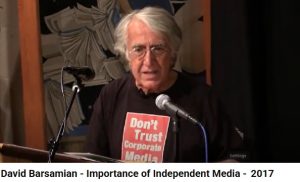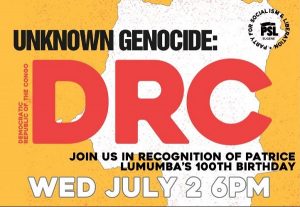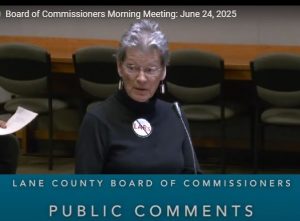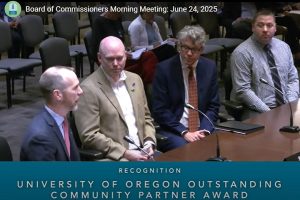Double Sided Media offers advice to the KEPW Youth Radio Project
11 min read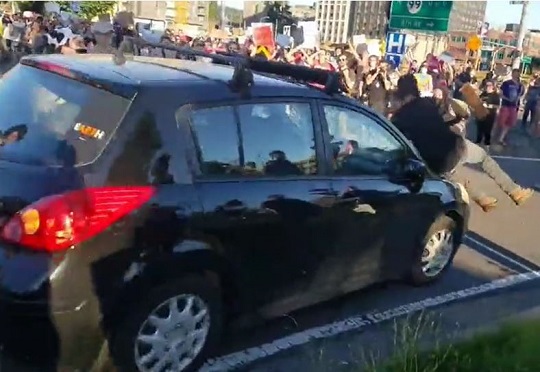
Protests erupted after the recent Supreme Court decision overturning Roe v. Wade. Here in Eugene as 1,200 marched in the streets, Double Sided Media was there. James Croxton posted video from the scene as a car drove into a crowd of human beings.
[00:00:14] (Crowd): That’s the third vehicle to drive through the crowd. Number three in less than 10 minutes. Go get the (person)! Go get him, yeah, do your job!
[00:00:46] John Q: We asked Double Sided Media to offer some advice for our KEPW News reporters and the Youth Radio Project. We expect more civil unrest throughout the summer.
[00:00:57] James Croxton: How I balance the need for reporting versus my own personal safety. And that’s a huge question. And honestly not one that I think about enough. We started DSM in the middle of August 2020 during the George Floyd protest. And at that point, we had already been through the main riot in Eugene, we had already been through Thurston which was July 29, 2020.
[00:01:23] We had already been through all of that. And so I guess I have a baseline in my head of okay, what do I expect? I do a lot of work in Portland and one of my other ‘jobs’ is, I’m a researcher for the Chemical Weapons Research Center, which, involves me going out to Portland actions, especially when I know almost certainly that I’m going to get tear gas or shot with projectiles or something like that.
[00:01:50] And you just go into it with an expectation that something is going to happen. And if it doesn’t, you’ve lucked out. And it’s always a plus.
[00:01:58] That being said, I think now I am less concerned about state violence towards protests. I mean, even given what happened two weeks ago, I’m less concerned about that and more concerned about right-wing chuds, as we call them, showing up and doing things and trying to cause things.
[00:02:17] They’re everywhere. And we are in a very unique spot here in Eugene Springfield, Eugene especially, where we’re considered liberal or progressive, and in reality, like you go five minutes outside of the city and you’re in Trump Town. And you have these right-wing, I don’t even want to call ’em activists, but right-wing individuals who—
[00:02:41] You know, we have local Proud Boys and we had people like Geena (Hager) Shipman and other individuals that have close ties with insurrectionists and violent right-wing groups. And they get a pass by law enforcement. I mean, look what happened at that protest two weeks ago. We had a man who I thought was a Boogaloo Boi earlier in the day, based on his attire, came out that night, this time with the AR-15 over his chest.
[00:03:08] And he self-professed to some people to be a Three Percenter. And what really struck me, when one of the protesters asked the police, you know, ‘Can you just station a cop, like, near him just to make us feel a bit safer.’ And the cop said, ‘I’m more concerned about the people across the street in gas masks.’
[00:03:25] And I’m just like ‘What? What!’ And so yeah, you have these right-wing counterthreat people that, frankly, want to be another Kyle Rittenhouse, and they have a pass from the police.
[00:03:42] Robert Scherle: Yeah, it’s, it’s very different here. I’ve covered a lot of protests in Hong Kong where it was primarily the protestors against the police. The protesters were pretty much on your side and it was more about watching out for the police.
[00:03:55] Here where we had protestors and then counter-protestors and then police, it would got really confusing because there was a lot of intermingling and you always try and watch your back.
[00:04:08] So it’s much more confusing and chaotic here now when you have the three different factions going at each other. It’s just all about keeping your head on a swivel and I think, whereas I’m taking pictures, so I think it’s much more visual, James is writing notes down, so I think it’s a little more difficult for James.
[00:04:30] James Croxton: As Robert said, it’s multiple different threats, but the multiple different threats are like in cahoots with each other, and it’s a danger, especially as we get closer and closer to 2024.
[00:04:40] And when something happens, like a car tries to go through the crowd, which I’ve seen countless times at this point, or, some sort of violent arrest or scuffle, I try to get to that location as fast as I can and pull the camera out and start recording.
[00:04:57] But you know what: I can’t catch everything. And there are some instances where I’ve done things where in hindsight I’m like, ‘Oh, that was really stupid of you.’ I think of this one protest in 2020, we went to the Lane County Jail.
[00:05:15] And there was a mysterious man throughout the day. And he had a World War II-era gas mask on just looked hella sketch. And he had a pistol on his side. And at one point, after people started to question who this guy was, he felt threatened and he pulled the gun out, cocked it, and pointed it.
[00:05:34] And yeah, I was one of the five or six people that chased after him down the streets. So it’s like, ‘Uh…’ And this is before I started wearing a bulletproof vest. So in hindsight I wouldn’t have done that then, but now can determine hopefully better what kind of risk I’m getting myself into.
[00:05:53] I’m not always successful.
[00:05:54] John Q: We asked about their field equipment.
[00:05:57] James Croxton: The two best things I could ever recommend when you’re going into a situation where, you know, there’s even a chance of getting tear gas, I would say, have a respirator. Or whether it’s a full face one, which is ideal. If you don’t have a full face one, make sure you have eye protection of some sort, ’cause it will burn.
[00:06:15] If you wear contacts, don’t that night. Because they can melt onto your eyeballs.
[00:06:20] In terms of liquids, saline or water, either/or work fine. Do not use milk. Common misconception. Don’t do it.
[00:06:30] And even in the middle of the summer I wear long sleeve shirts because I don’t want that residue to get on my skin and cause a more physical burn than what—if it went through my nose or my mouth.
[00:06:44] John Q: Any special equipment?
[00:06:49] Robert Scherle: I think just the gas mask and the bulletproof vest. And that’s it. I don’t want to be weighed down by too much either.
[00:06:58] James Croxton: (Agreeing:) No. I am starting to include my helmet more often. And I’m actually in the process of getting a ballistic helmet, just because, I’ve worn a helmet at actions previously in Portland, well, a couple weeks ago here, even, but the skateboard helmet, I’m not wearing that for gunshot protection. I’m wearing that for canister protection.
[00:07:20] But at this point, and the political climate and the way things are, I think it’s time to have a ballistic helmet, unfortunately, and I am starting to wear my 18-pound steel-plate vests more, actually almost every action now. Unfortunately.
[00:07:34] Gauze. I usually carry a Ziploc bag full of gauze Band-Aids, not necessarily for myself, but to pass out if need be. It does come in handy.
[00:07:45] Trying to think, what else do I bring? Sometimes I’ll bring an audio recorder. I really don’t like using them. It’s just one extra gadget in my hand when I need to not be looking down as much. I do have a camera. I have a Sony RX100, I love it. It’s a great little DSLR. It does the job. That being said, if I’m going to a direct action where I know there’s going to be black bloc, I’m not going to bring it, because it will get smashed.
[00:08:10] Maybe not in Eugene—Double Sided Media is pretty accepted within the community. We were in Portland two nights ago and my photographer got threatened. He had to leave. Other than that, (I recorded it) all on my phone. And that’s the safest thing. And that’s also why I do the live tweeting because not only am I making what’s happening more accessible to people who aren’t there, but it’s my way of taking notes and it’s all time-stamped. And so it’s like the best of both worlds for me, in that regard.
[00:08:39] And like I said I tend to bring at least two water bottles. And for my work in Portland, I make sure that I have—I call it my special backpack—’cause it’s my reporting backpack and the big front pocket is for nothing but munitions. I think there’s still powder in there.
[00:09:03] John Q: Has your equipment been confiscated or smashed?
[00:09:04] James Croxton: No. No. Fortunately not. I personally have not had anything destroyed or tampered with. I’d ask Robert. Robert, have you ever had any equipment taken from you or smashed?
[00:09:16] Robert Scherle: No. I’ve had people get in my face and block my view and tell me to stop taking pictures of ‘their people,’ and if I continue to, he would, whatever, with my camera. Yeah. But no one’s actually physically touched me.
[00:09:36] James Croxton: Yeah. I’ve had things thrown at me, but I haven’t had anything taken.
[00:09:38] Robert Scherle: Yeah. At the beginning two years ago, when I would go out, I would walk among the more of the right-wing faction, and I would strike up conversations, and I learned this from one of the video bloggers that was out at the time. His name was Trey and he would talk up everyone and just start conversations.
[00:10:00] And once they would always converse and it seemed to normalize things and reduce the threat. So I did that too. And I mean, I was in the service, so I kind of know how to talk to people and I’m, I love America and, you know, I want things to progress . But I just, I don’t know how much things have progressed since then, if things are becoming more radical or if there’s more people traveling around now. So I’m becoming a little more wary about this.
[00:10:26] John Q: We asked how they approached their reporting about the event.
[00:10:30] James Croxton: I try to pinpoint important events or important things that happen during an event.
[00:10:38] My goal when it comes to reporting and documenting actions, it’s not my job to incriminate people. It’s not my job to do any of that. In my opinion, I am here more of a check and balance to law enforcement and the state. And that’s what I focus on. Again, there’s a lot of standing around, not doing much at these events where sadly, you’re just waiting for the next shoe to drop. And you kind of just position yourself to where you think that next shoe is going to drop and hope that you’re ready when it does.
[00:11:12] Robert Scherle: I’m more old-school. I’m almost 60, so I grew up in the age of stills. So I care more about the individual shots. I’m there to try and capture the images in a sort of an influential way. And as I have during some of the protests, I had some connections with some of the local media outlets, like, KVAL, and I would submit some photos to them, get home and edit and then get those off, like, around midnight, one o’clock.
[00:11:40] But it’s mostly, for me philosophically, it’s documenting another troublesome time in America. And just like growing up and seeing the photos of the Civil Rights Movement in the ‘60s, I was hoping we’d learn from those images and that history, and if we haven’t, I just have to keep recording.
[00:11:56] John Q: Any advice for our youth reporters?
[00:12:00] James Croxton: All it takes is a cell phone and a cell phone camera.
[00:12:03] You know, you don’t have to be up close. You don’t even have to take photo or video, as long as you can see and hear what’s going on and you feel safe. Jot some notes down and believe me, after you’ve been at an event and you’ve been jotting these notes down, the story reveals itself every time.
[00:12:23] Robert Scherle: And for me as a photographer I’m more on the technical side. If you do enjoy shooting, just shoot as much as you can: Street shooting, family shooting, event shooting. And just the more you’re familiar with your camera, the more you understand the settings, the higher the chance of getting a usable image when things get hectic.
[00:12:44] James Croxton: Don’t be afraid to take risks. Again, don’t risk your life. Don’t do that. But don’t pass on a story just because maybe you don’t think it’s not interesting or you think somebody else won’t find it interesting. Somebody will find it interesting. And somebody will take something away from it and somebody will appreciate it. And it’s just to do what you want to do. And one thing that I, it’s a detriment to myself, but be prolific too. Don’t pigeonhole yourself into like one narrow focus, but write about, report on a variety of things.
[00:13:22] When I got started in journalism, I was doing school administration, investigative reporting, I guess you would say at LCC. And then when I got to U of O at the Emerald I was the film and television reporter and I just ended up being at the first protest and everything just kind domino-effected from there. But I’ve still managed to keep my range going and I do try and report on art galleries, film festivals, stuff like that.
[00:13:5`] So be prolific, build a portfolio and just do. You can’t succeed if you don’t try. And if you don’t start.
[00:14:00] Robert Scherle: I would just say again, as a photographer, talk to the people and learn about the people and I think that reflects in your images if you get to know the people better.
[00:14:10] James Croxton: Absolutely. One that brings me back to, you know, one thing that I think separates Double Sided Media from a lot of other media is that we have built relationships with a lot of our sources and the people report on and so on and so forth.
[00:14:25] It really just makes the whole process go easy because there’s a mutual trust. And as long as, as long as someone knows that you’re on the right side, you’re on the good side, you’re friendly, it’s all good. You know, that’s kind of what happened in Portland two nights ago, where Rob and I’s mere presence literally caused infighting for like five minutes, and it was like, ‘What the hell is happening?’ But you had some members of black bloc who were like, ‘Get out of here.’ And then you had other folks were like, ‘But this is Double Sided, you know?’
And so you have that like weird balance. Always try and build relationships and check in with your sources. Even if you’re not working on a story, I do this all the time where I just like check in like, ‘Hey, just want to check in, how are you doing? What’s going on in your life right now? Anything that you need to talk to me about?’ Or, you know, something like that. And then, one, you’re going to build those relationships. And two, you’re going to get more stories later on down the road.
